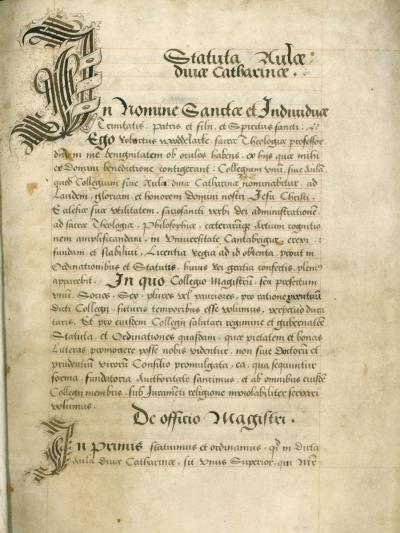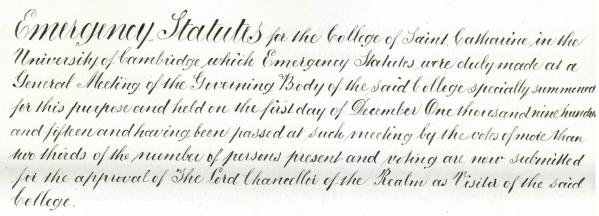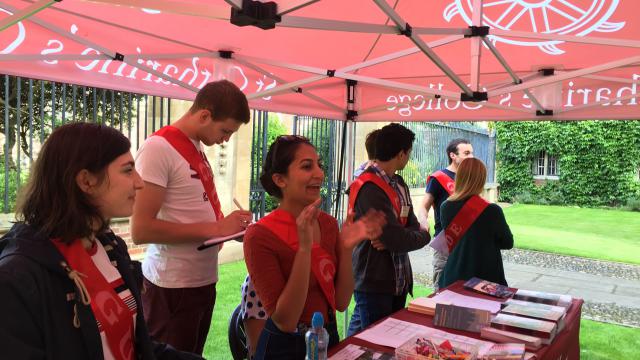
By 1916 the War had already been going on for two years. The predicted ‘short’ conflict had turned into a war of attrition with both sides taking heavy casualties in trench warfare. 1916 saw offensives at Verdun and the Battle of the Somme, both of which resulted in little gain of territory for either side. Back in Britain, 1916 brought the arrival of conscription, which further reduced numbers of men able to attend University. The University calendar for 1916–17 has a whole section devoted to the War, detailing the number of members on military service, the numbers in residence, the workings of the University’s ‘War Committee’, and emergency measures within the University, including the adoption of Emergency Statutes.
In this article the Archivist turns her attention to the Emergency Statutes brought in to facilitate the running of the College during the wartime period. Statutes are rules or regulations ‘made by a guild, corporation, university, or other organization, especially concerning the conduct of its members’ (OED Online, Oxford University Press). St Catharine’s College has Statutes back to the Mastership of Richard Roche (1475–80), though Woodlark may have had a hand in drafting these. The earliest surviving copy in the Archive is believed to have been made between 10 November 1487 and 14 October 1504.
These early Statutes were revised by Royal Commissioners in 1549 to remove the ‘superstitious’ features of the original foundation. The 1549 statutes governed the College until 1860. Subsequent changes were made in the 1870s and 1880s, but it is the 1915 changes we look at here.

Reference: XL/11
The Emergency Statute agreed by the College’s Governing Body in December 1915 was supplemental to the existing Statutes and was designed to take account of the change in circumstances for the College that the War had brought about.

Reference: S/1/13

Reference: GB/1/3
The Statute allowed those taking part in the War as military personnel, in the service of the Crown, working with the Red Cross or St John Ambulance or similar, or as a prisoner of war to remain eligible for Entrance Scholarships or Exhibitions for a period of up to nine months after the emergency period. The College was also granted the right to suspend payments of emoluments to students, scholars, exhibitioners or sizars for the duration of their war service, and resume them at the end of the emergency period, so that the actual tenure of the emoluments would correspond to the period for which the student was originally elected. Vacant Fellowships, studentships or scholarships, or the payments of any moneys distributable in Exhibitions, Fellowships, Studentships or Scholarships were also allowed to be suspended during the emergency period. Money not paid would go into the Tuition Fund and for other emergency purposes. From the Burrell Fund, the College was allowed to make payments for ‘the maintenance of the Establishment of the Fund) had been used to buy the advowsons of Marnhull (1873), Newent (1874) and Little Shelford (1879) as a means of securing the rapid succession of Fellows, most of whom were in holy orders.
The Statute drawn up by the College was very similar to those of other colleges. The same provisions for the suspension of elections and payments can be seen in the Jesus, Downing and King’s College Emergency Statutes, for example. The University and Colleges (Emergency Powers) Act 1915 gave the Colleges direction on the drawing up of Emergency Statutes, which explains their similarity.
The 1915 Act provided for the Emergency Statutes of the colleges to be in place until ‘the end of the next calendar year after that in which the present war terminates’. Once the so called ‘emergency period’ ended, St Catharine’s would revert to its 1882 Statutes before passing a new set in 1921.




